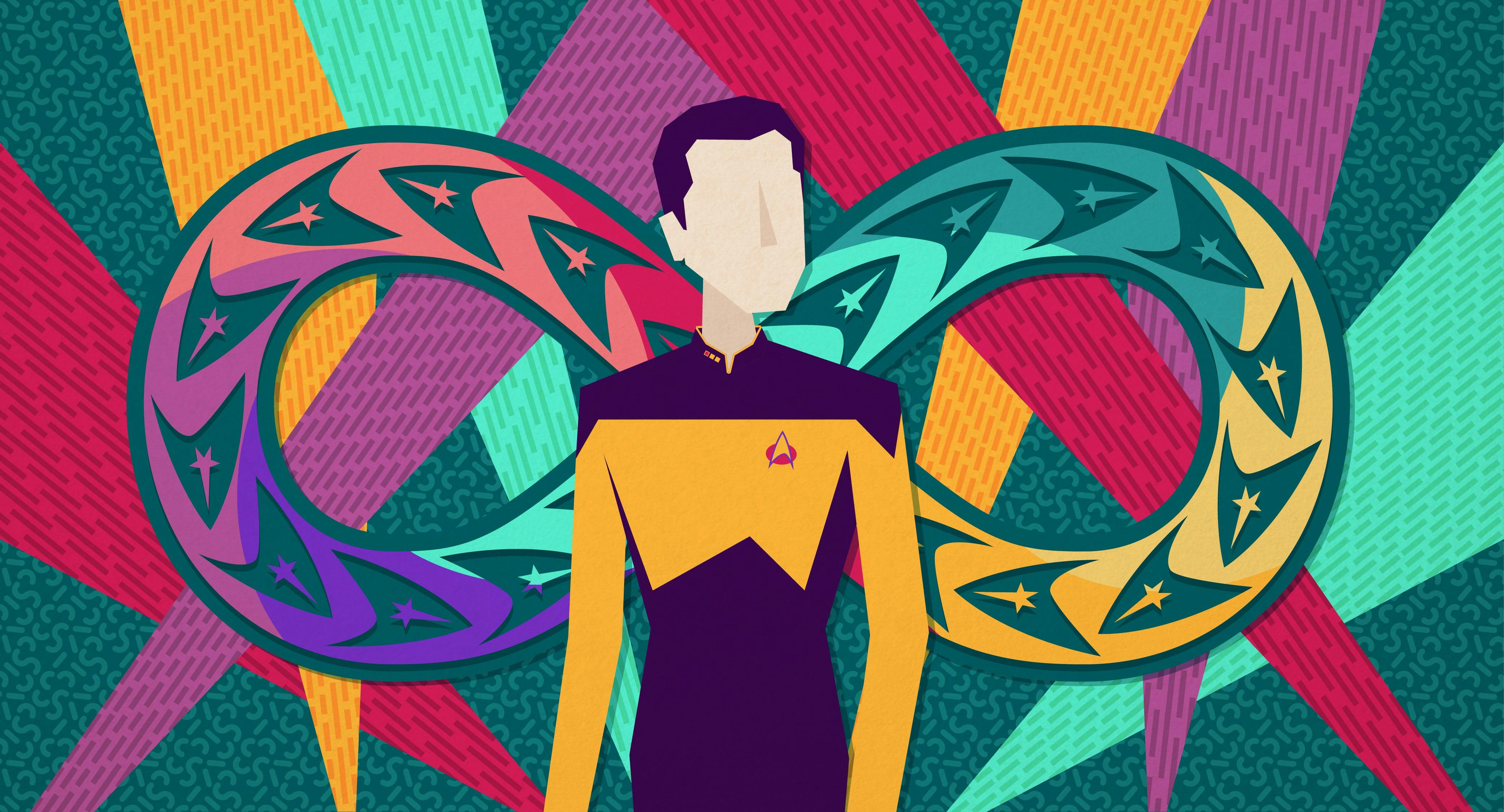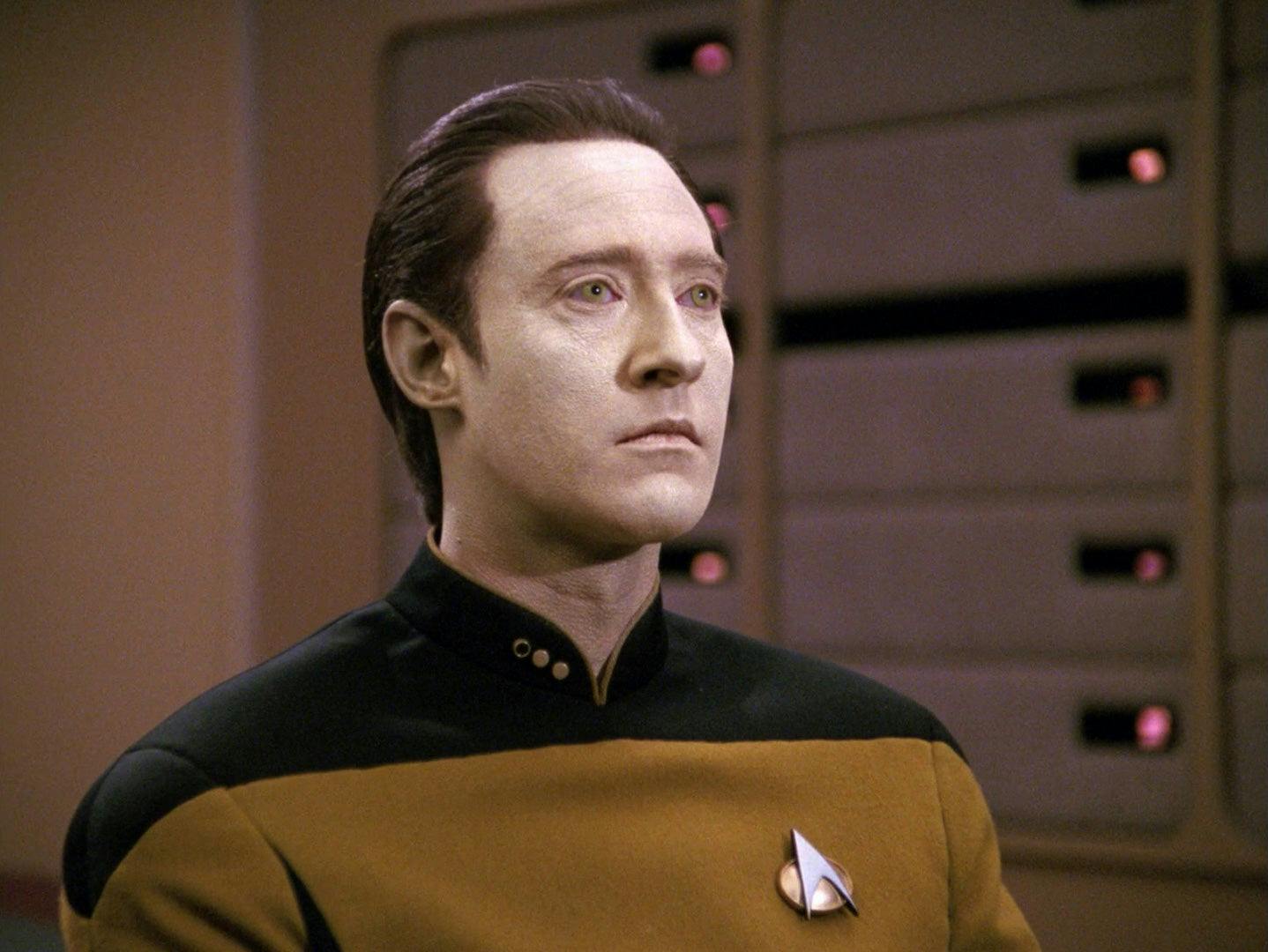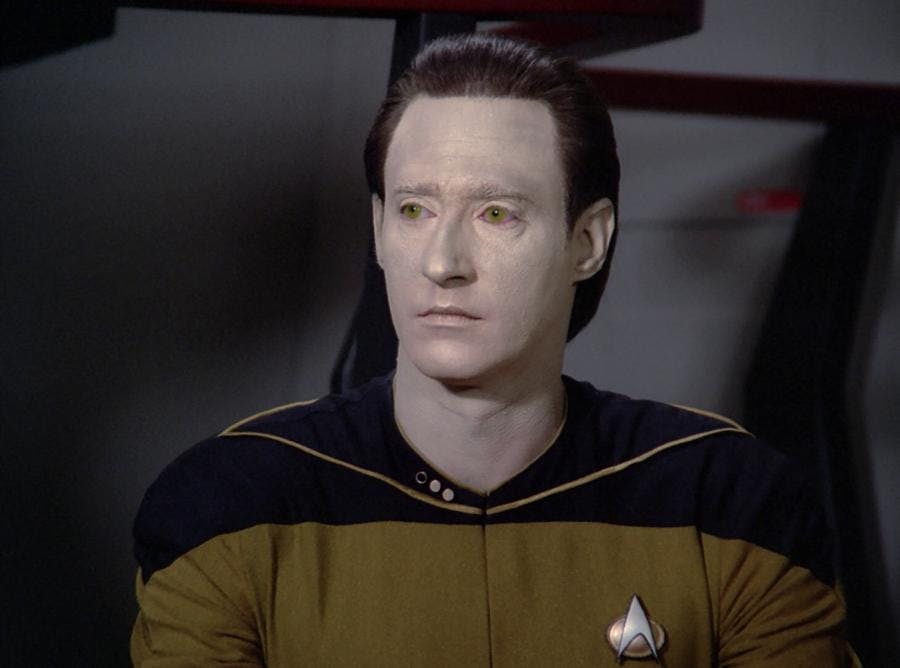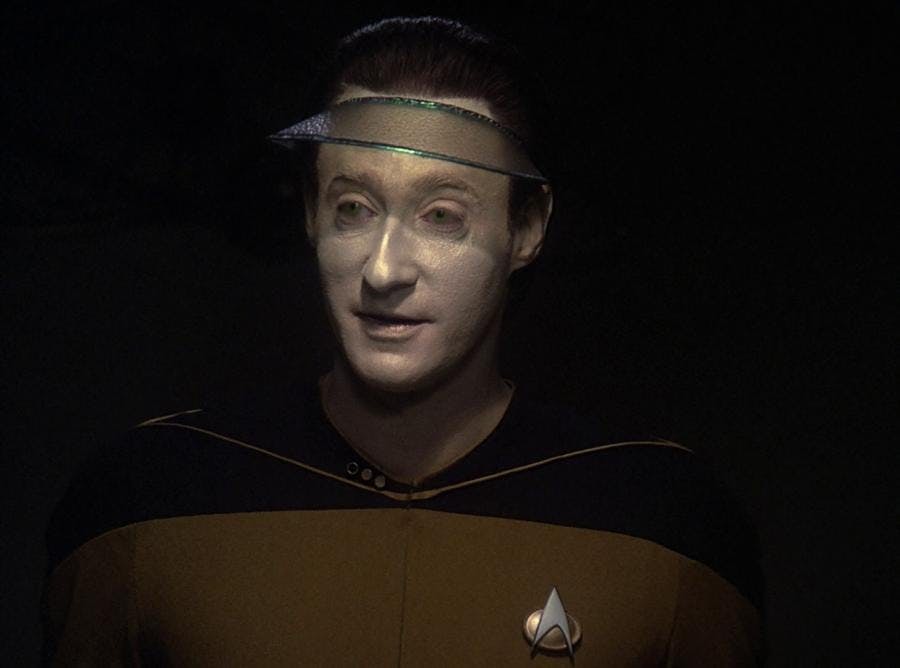Published Apr 17, 2023
I Am Not A Robot
As Data learned what it means to be human, I did too.

StarTrek.com
“I am superior, sir, in many ways,but I would gladly give it up to be human.”- Lt. Cmdr. Data, "Encounter at Farpoint"
As a shy, strange kid, science fiction and I seemed made for each other. I was baffled by, and barred from, the social groupings of my classmates which seemed to form by magic, but it was incredibly easy for me to slip into the worlds of Doctor Who, The Twilight Zone, and Star Trek. My alienation from my peers led me straight into the realms of countless alien species and endless possibilities.
Strange new worlds beckoned, and among those exploring them, was Star Trek: The Next Generation’s Lt. Cmdr. Data. An android wholly unique in the universe, Data knew he was a machine but longed to be human. He lacked the most basic understanding of human behaviors, could not identify or express emotions, but tried his best to become part of the social structure of the Enterprise-D’s crew.
During TNG's seven-year run, Data's struggles to understand himself and what it means to be human struck a chord with the autistic community. It certainly struck one with me, and it’s continued to sound ever since.
“It is the struggle itself that is most important.We must strive to be more than we are.It does not matter thatwe will never reach our ultimate goal.The effort yields its own rewards.”- Lt. Cmdr. Data, "The Offspring"

StarTrek.com
When people make a connection between Star Trek and autism, it tends to involve Spock with his relentless logic and need to suppress the human side of himself. For Spock, emotion wasn’t just overwhelming; it was dangerous. It was a force that essentially de-evolved him into a savage state which he would do anything to avoid. While I don’t disagree with the half Vulcan becoming a de facto stand-in for autistic people in Star Trek, I do find it interesting that it’s the character denying his humanity which became so associated with Autism Spectrum Disorders.
Data, on the other hand, isn’t human at all. Instead, he’s an android crafted to look human with subroutines randomizing his blinking and breathing, a circulatory system that lubricates his internal circuits, and a positronic brain capable of holding vast quantities of information and performing numerous complex calculations in an instant. He might’ve passed for human at first glance if not for his golden skin and yellow eyes.
While Data had the luxury of knowing what he was, many autistic kids, such as myself, had no idea why we felt so different, so separate, from those around us. We autistics stand out from our peers not because of metallic skin, but because of our specialized interests, our tendency to take things literally, and our inability to understand social rules. We learn enough social skills (by sheer repetition) to “mask” so we can pass as Neurotypical for years or entire lifetimes; though we seem to do it so poorly we’re still seen as terribly odd if not downright deficient. And, yes, we are regularly called robotic and machine-like for our repetitive movements, often overly formal speech, and need for routine.
Data did those things too. His interest in learning to paint or play instruments was detailed and consuming. He took people’s words and actions at face value, having to learn about deception the hard way. Even his friendships were fashioned by repetition instead of forming organically. Data also learned to whistle and laugh in his own attempt at “passing” as human with varying degrees of success. While not always understood, he had supportive crewmembers to help teach him the complexities of human nature even as he retained his own unique personality.
“This is not ego or vanity,but when Doctor Soong created mehe added to the substance of the universe.If by your experiments I am destroyed,something unique, something wonderful will be lost.”- Lt. Cmdr. Data, "The Measure of a Man"

StarTrek.com
In the second season episode, "The Measure of a Man", Data is in danger of being disassembled as he is technically the property of Starfleet. He doesn’t want to undergo the procedure but can’t seem to find a way out. Captain Picard, however, won’t accept Data being seen as anything less than a sentient life form. After a testy legal battle, Picard is able to convince the judge whatever kind of new life form Data is only Data should have the right to choose what happens with his own life.
While the subject matter made for a great hour of TV, fighting to be seen as thinking, decision-making beings is an unfortunate reality for autistics. Data's having to prove he was sentient, and not merely an object, paralleled both verbal and non-verbal autistics fight to be seen as fully human and not just as something other. Non-verbal autistics in particular are thought to be more robot than human even though the ability to speak isn’t what measures someone's intelligence or self-awareness.
Data is a machine, by his own admission, but he’s also self-aware, intelligent, and conscious of those facts. His differences from the majority of humans (lightning-fast problem solving skills, out of the box thinking, and unbreakable concentration contained in an artificial body) made him valuable to Starfleet, but also made him less than in the eyes of the law. It’s a fact and a feeling Autistics and other people with disabilities know all too well as our rights to self-determination and bodily autonomy are often challenged in legal settings.
If only there were enough Picards to go around.
Data, What Are You?
In many ways, I envied Data. He was able to travel to strange new worlds, was nearly indestructible, and was able to download huge amounts of information in seconds. Here was an incredibly powerful being who could have inspired fear but instead elicited deep empathy. He knew he was alone, essentially the only member of his species, but instead of being bitter, he strove to understand others’ behaviors and perceptions despite his limitations in doing so.
While Data's journey could be painfully relatable, it was his ultimate decision to remain just as he was when turning down Q's offer to become human that gave autistic kids like me the awareness we didn't have to be like all the others to be real. We could strive to function more easily in the world and still accept ourselves just as we were and are. We were human regardless, and, in his way, Data was too.

StarTrek.com
Spock might be the better known autistic stand-in for Star Trek, but Data has just as much claim to the title. He not only gives autistics a relatable character to follow, but he also gives Neurotypical individuals a glimpse into what being autistic is like. Each group’s perception of Data and his journey can give the other insight into their own experiences of the world, helping us all explore just what it means to be human.
And what is the purpose of Star Trek if not encouraging that kind of understanding?
This article was originally published on April 6, 2021.
Katherine Taylor’s (she/her) becoming a writer was prophesied by her grandmother who declared Kate had too grand a name to be anything else. Kate’s work can be found at Bright Wall Dark Room, Bold Culture, and Medium. Catch up with her latest exploits on Twitter @katherine_tay13.
Stay tuned to StarTrek.com for more details! And be sure to follow @StarTrek on Facebook, Twitter, and Instagram.

